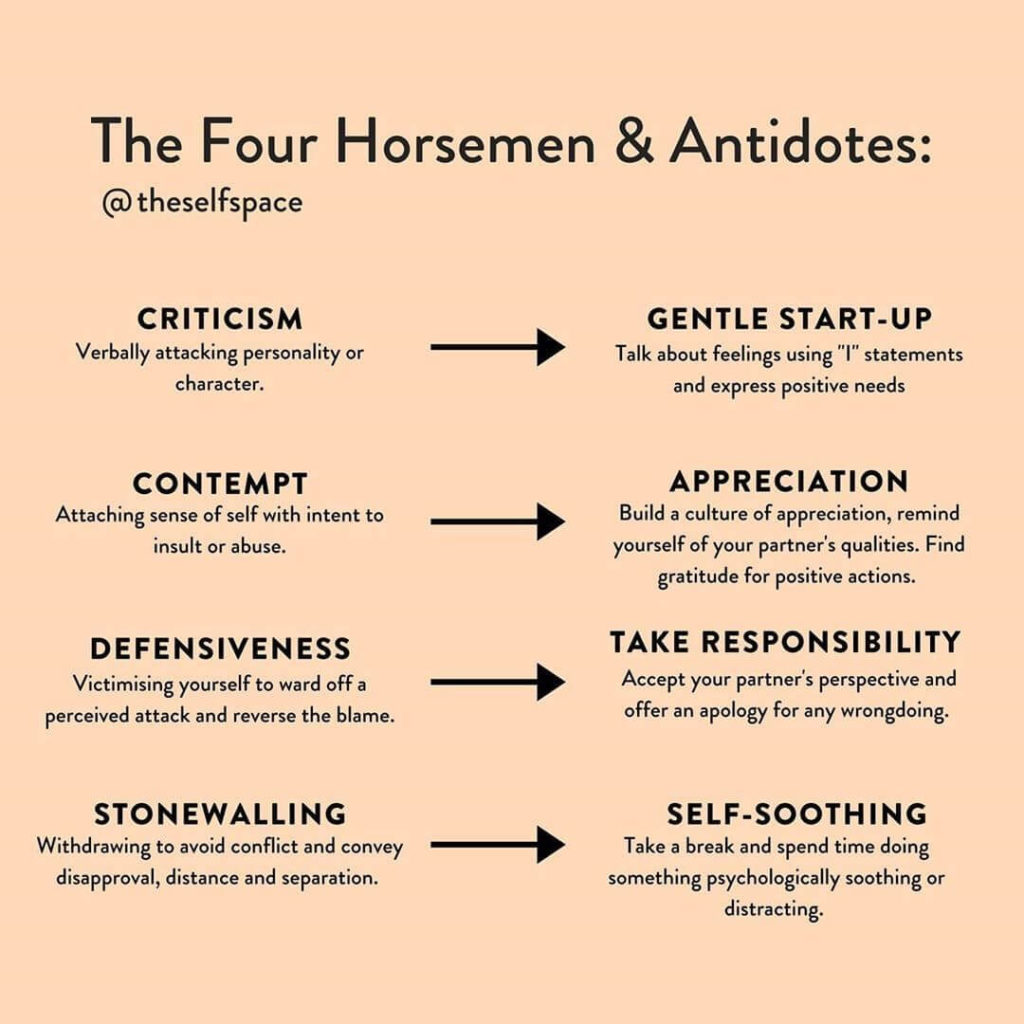Even the most successful relationships have conflict. It is unavoidable and natural, but how it’s managed determines the success or failure of a relationship.
You may have heard of the Four Horsemen of the Apocalypse in the biblical sense, but they’re also metaphors to describe toxic communication styles in relationships. According to psychologist John Gottman’s research, they can even predict the end of a partnership. Identifying the Four Horsemen in conflict conversations is the first step to putting an end to them and replacing them with healthy communication patterns.
In a recent article with Kenosis intern Addi Lillywhite, we briefly touched on the Four Horsemen of the Apocalypse. However, we believe couples need a deeper understanding of the topic to preserve their relationships. We asked her back to further describe the Four Horsemen of the Apocalypse, and how to recognize the cycle in the heat of an argument and effectively communicate through conflict.

The 4 Horsemen of the Apocalypse
The Four Horsemen of the Apocalypse are metaphors used to describe reactions to relationship disputes, with reference to the Four Horsemen of the apocalypse from the Bible. Addi explains, “Just as conquest, war, hunger, and death are precursors to the end, Gottman’s Four Horsemen (criticism, contempt, defensiveness, and stonewalling) could, according to Gottman’s research, be precursors to relationship demise.”
The Four Horsemen are:
- Criticism: An attack on who your partner is, not simply a critique or complaint.
- Contempt: Being mean, sarcastic, ridiculing, name-calling, eye-rolling, heavy sighs.
- Defensiveness: A response to criticism, putting the blame back on the partner.
- Stonewalling: Withdrawing, shutting down, stopping response or interaction.
According to Gottman, contempt is the worst of the Four Horsemen. Treating your partner with disrespect conveys superiority and is the most destructive negative behavior. Dr. John Gottman has found contempt to be the number one predictor of divorce.
Although contempt is the worst behavior, any one of these behaviors can cause a disagreement to become worse. Addi also mentions, “At times, men and women can be more likely to demonstrate one of the Four Horsemen. For instance, 85% of stonewallers observed in Gottman’s ‘love lab’ were men. However, remember, anyone can exhibit these behaviors!” Stay conscious of Horsemen behaviors by yourself or your partner to reduce their occurrences in your disagreements.
Recognizing the Cycle of the Four Horsemen
Not all conflict is bad; it presents an opportunity to understand your partner on a deeper level. There are some problems you may never “resolve” due to natural differences between you and your partner. But resolving personal differences isn’t the goal. Sometimes it comes down to how to manage disagreements when they do come up. Trying to fundamentally change your partner rather than resolve disputes is when the Four Horsemen may appear in an argument.
Being aware of the Four Horsemen is the first step in being able to stop them. Addi explains, “These habits and behaviors are like relationship poison. Luckily, poison often has an antidote. The next step is to replace those unhealthy behaviors with new, healthy behaviors.” The below image from the Gottman Institute has wonderful alternatives to the Four Horsemen that you can utilize to counteract negativity.

According to Addi, the Four Horsemen may be present, to some degree, in every partnership. She says, “If [the Four Horsemen] have created increasing distress in your relationship, it’s not too late to fix the problem. They may be ‘predictors’ of relationship demise if left unchecked, but they are not a death sentence! As couples consistently practice the antidotes to the Four Horsemen, the couple can build relationship stability.” How can you change your attitude and language toward your partner to reflect the Four Horsemen antidotes?
Effectively Communicating Through Arguments
Our personal communication style is part of who we are, but it doesn’t mean we can’t learn to overcome it and change course. There is always room for improvement when communicating with our partners. Awareness and working to create healthier habits is the key to overcoming the cycle of the Four Horsemen of the Apocalypse.
Addi personally relates to the ways that understanding the Four Horsemen can improve relationships. “Learning about the Four Horsemen during my undergraduate studies changed how my husband and I communicate. I know firsthand that being aware of and working to reduce their presence in a relationship works!”

To avoid reacting to conflict with Four Horsemen behaviors, Addi recommends, “Figure out what works for YOU as a couple. There are no foolproof tricks or plans. This may take time, consistent practice, and maybe even a few failed attempts, but focus on progress.” As Gottman says, the motto for success is ‘Small things often.’ Every effort you take to make your partner feel heard, appreciated, and understood is a step in the right direction.
Working to reduce the presence of the Four Horsemen takes effort from both partners. As Addi says, there is no right way to do things. However, a therapist can take an unbiased approach to your unique situation and partnership.
If your relationship has fallen victim to the Four Horsemen, reach out for help. We have expert marriage counselors ready to help both of you change your communication styles and eliminate the Four Horsemen from conflict conversations. Your relationship isn’t doomed; it just needs a refresh and some education to continue in a healthy way.

